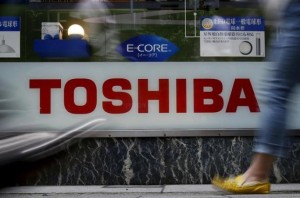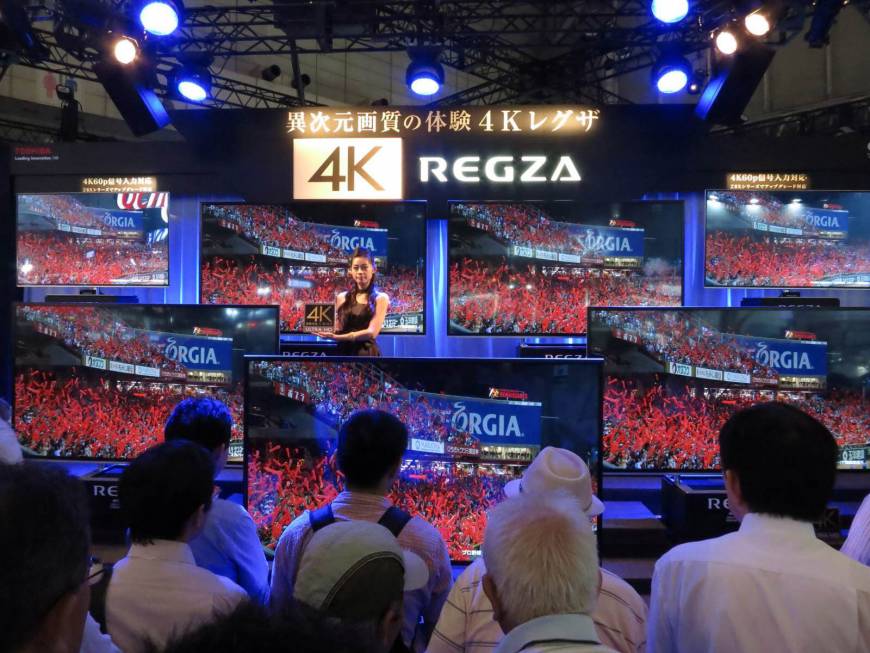An Industry Giant Stumbles, Then Falls; Can It Get Back Up?
 Toshiba, once the embodiement of Japanese industrial might offering everything from rice cookers to nuclear reactors, has released financial results for the first three quarters of the current fiscal year and it’s not good. For the first time in the over-century old company’s history, the results announcement warned of doubts about the company’s ability to continue as a “going concern.” And that wasn’t the only bad news included in the report.
Toshiba, once the embodiement of Japanese industrial might offering everything from rice cookers to nuclear reactors, has released financial results for the first three quarters of the current fiscal year and it’s not good. For the first time in the over-century old company’s history, the results announcement warned of doubts about the company’s ability to continue as a “going concern.” And that wasn’t the only bad news included in the report.
See the stunning news about Toshiba’s dire circumstances…
We’ve been regularly reporting on the dramatic sequence of events that has brought what was once one of the most powerful – and most respected – industrial companies in Japan to its knees. It is not crazy to suggest the company could collapse under the weight of a combination of bad management, bad investments, and bad luck.
The company’s financials, released just this past Tuesday, showed that the company has generated a net loss of a stunning ¥532.5 billion ($4.81 billion) for the 9-month period ending December 2016. As the Nikkei notes, this places the company’s net worth at a negative ¥225.7 billion and puts them at risk of being delisted by the Tokyo stock exchange.
Just over a month ago, the company forecast a loss for the full year of ¥390 billion yen, a distressing number. Now, just weeks later, the company has said it now forecasts a net loss of ¥1.01 trillion ($9.2 billion).
‘Substantial Doubt’ About Survival
But the bad news didn’t stop there. For the first time ever in the history of the company founded in 1875 – just after the Industrial Revolution – the company had to admit in their report:
There are material events that raise substantial doubt about the company’s ability to continue.

That tidbit doesn’t exactly make you want to run to your cookie jar for more money to invest in the company. But even this dramatic announcement wasn’t the only first in this financial report – the company was forced to do something else that’s unheard of in Japan. Toshiba had to release their report with no certification from the company auditors. Investors will tell you that when a company’s auditor refuses to certify the results – that’s a very, very bad sign.
Auditors Refuse to Certify Results
As the Nikkei put it, “The rift with PwC [Price Waterhouse Cooper Aarata, Toshiba’s auditors] spells more trouble for the conglomerate, though, as it casts doubt on Toshiba’s ability to release auditor-approved results for the full year on time.”
The company was already in a bad way with investors. The report released this week was originally scheduled to be released on February 14th, but Toshiba announced there would be a one-month delay due to the fact that the company had to investigate rumors of management wrongdoing at its U.S.-based Westinghouse Electric subsidiary. This news, of a delay and another investigation, was a further shock to Toshiba investors and an incredibly unfortunate echo of their own accounting scandal from 2015 when top executives illicitly inflated profits.
Westinghouse, a company that Toshiba had acquired to help it build nuclear power plants, tanked Toshiba’s results this year, forcing them to take a $6.3 billion writedown, as the subsidiary stumbled with cost overruns on multiple U.S. projects. While Toshiba’s accounting scandal in 2015 was a major stumble, the Westinghouse matter has caused the company to fall…and fall hard.
Westinghouse – A Continuing Problem
By mid-March, Toshiba had to delay the release of their results again, saying that the investigation continued. According to the Nikkei, it is accounting for the Westinghouse nightmare that has put Toshiba at odds with its auditor. Finally, after further delays, Toshiba decided to go ahead and release the results, even if the auditors refused to sign off on them. Desperate times, it seems, call for desperate measures.

“Even if we postponed our earnings report further, we do not know whether we can receive approval [from the auditor],” Satoshi Tsunakawa, Toshiba’s president, told reporters on Tuesday. “This is highly unusual, but we could not cause further troubles to our stakeholders [by not announcing the results],”
It is hard to accurately articulate to the reader what a stunning fall from grace Toshiba’s situation represents. Toshiba was once the bluest of “blue chip” stocks, one of the most investable companies in Japan. Workers bought shares of Toshiba stock in anticipation of retiring decades into the future. Retirees bought shares of the safe-as-can-be stock to extend their retirement income. New parents bought shares in their babies’ names at birth to provide for future college funds.
Now, investors don’t know what to think, and the shares of Toshiba stock, already well off for the year, stumbled another 2.7% on Tuesday.
Putting the Crown Jewels Up for Sale
To try and get themselves out of this mess, the company has invoked – if you’ll pardon the pun – the nuclear option. It will put its highly valued crown jewels – in the form of its successful and coveted microchip division – up for sale. Toshiba has been a market leader in the NAND flash memory business for nearly 40 years. And although they’ve only recently been overtaken by Samsung, Toshiba maintains a strong #2 market position – and the company has been able to be both successful and profitable over the long haul.
So selling some or all of the microchip division will be painful for Toshiba. Approximately a dozen bidders have emerged from around the world, especially the United States, South Korea, and Taiwan. Foxconn, the new owner of Sharp, is said to be one of the bidders, offering $27 billion for Toshiba’s chip business. But, interestingly, so far no bidders have emerged from Japan – a sign of the flagging power of the country in technology…a category it once globally dominated.
With their self-inflicted wounds in 2015, when the company was hit with a massive accounting scandal…the giant stumbled. Now in the aftermath of the rapid decline of their nuclear business – embodied by the disasterous investment in Westinghouse…the giant falls.
As Toshiba itself admits – this time, it might not be able to get back up.





Leave a Reply